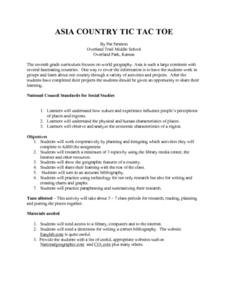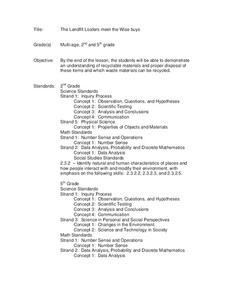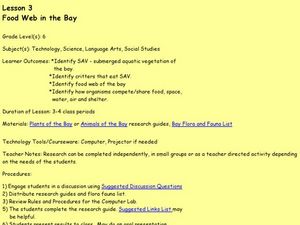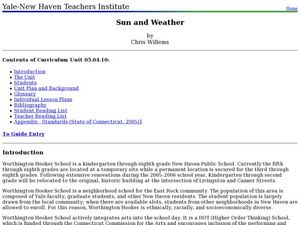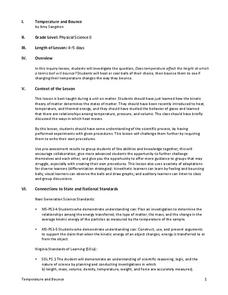Curated OER
Wetland Metaphors
Learners describe the characteristics of wetlands and identify their ecological functions. They inspect items and use them to create metaphors about wetlands.
Curated OER
Design a Reef!
Using a miniature coral reef aquarium kit, young ecologists model this unique ecosystem. They research various coral reef organisms and their niches, and they culminate the project by working together to write a report. Use this activity...
Curated OER
History's Thermometers
Ancient coral beds give scientists clues to past ocean temperatures in much the same way that tree rings indicate historical weather conditions. High school scientists examine coral oxygen isotope ratios and plot the data as a function...
Curated OER
Journey to America
Fifth graders carefully analyze the artwork, Les Emigrants, and explore the reasons that people emigrated to the United States, and what life was like for new arrivals. They discuss what things immigrants were able to bring with them and...
Curated OER
Sources of Potential Groundwater Contamination
Students construct models that demonstrate potential sources of contamination. Students select one type of contamination model (septic system, sinkhole, landfill, disposal lagoon, leaky barrels, oil spill, agricultural contamination) to...
Curated OER
Sink or Float
Second graders explore floating and sinking and make predictions about whether certain objects are likely to sink or float. They read the story Who Sank the Boat? by Pamela Allen. Pupils loacate rhyming words and discuss the events of...
Curated OER
Asia Country: Tic Tac Toe
Enhance your geography class's knowledge of the countries on the Asian continent with this research lesson. Individuals or groups use books, the library, and the Internet to research one Asian country of their choice. Handouts and...
Curated OER
The High Cost of Chemical Dependency
Sixth graders explore, analyze and study the effect and impact that humans have on the environment based on their choices as individuals, businesses and governments. They assess the balance between human activities and aquatic pollution.
Curated OER
The Landfill Loafers Meet the Wise Buys
Students discover recyclable materials and the proper disposal of those items through Internet research. Working in groups of four, they search the Internet for uses of recyclable materials. After research is complete, they participate...
Foreign Policy Research Institute
Exploring Korea
A thorough and fun lesson on Korea! In groups of four (Social Chair, Historian, Translator, Travel Agent) class members research North and South Korea to determine a good location for an overseas institute for studying abroad. Once this...
Curated OER
Food Web in the Bay
Sixth graders study the food web in a bay. In this food web lesson, 6th graders investigate the SAV- submerged aquatic vegetation of a bay including their predators, and how the organisms eat, have proper living space and water. They...
Curated OER
Plants in Your Gas Tank: From Photosynthesis to Ethanol
Explore ethanol and how it is produced. Young scientists investigate photosynthesis and fermentation to the concept of conservation of energy and mass. They discuss the environmental and economical benefits of ethanol as a fuel additive.
Curated OER
Teacher Appreciation Week (Elementary)
Primary writers will create a persuasive essay about Teacher Appreciation Week. Additionally, they will select a quote from a famous person and write a persuasive essay about how it relates to one of their favorite teachers. In the end,...
Curated OER
Speciation and Genetic Drift Worksheet
Fifteen terms pertaining to speciation, extinction, and gene flow are to be matched to their definitions. This simple, easy-to-read learning exercise can be used as a pop quiz for your biology learners when studying natural selection...
Curated OER
Dining Out With Fishes and Birds of the Hudson
While this lesson focuses on the birds and fish found on the Hudson River, it could be adapted for use in any classroom. Using a vocabulary list, learners explore the meaning of words like adaptation, habitat, barbel, and more. Then,...
Curated OER
Pond Ecology
A lab activity is a great way to incite thoughtful questioning and scientific processes. Pupils will collect organisms with a Petri dish, make observations, sketch the organism, ask questions, then attempt to identify the specimen...
Curated OER
Aquatic Science
What a terrific way to explore the pond habitat! Learners discuss the animal and plant life found in the Long Island area. They also discuss vocabulary terms, identify pollution concerns, and resource conservation.
Curated OER
Sun and Weather
How is the Earth's weather created? Middle schoolers will explain how the Sun's energy is transformed into different forms. They will perform mathematical calculations of volume, mass, and temperature. They they will explain the...
Curated OER
A Cost-Effective Model of Teacher Development
As funding for staff-development days dwindles, Professional Learning Communities offer a no-cost alternative for professional development.
Wild BC
Is Climate Change Good for Us?
Is it really that big of a deal if the global climate undergoes a little change? Young environmentalists consider this very question as they discuss in small groups the impact of different climate change scenarios on their lives, their...
Curated OER
Past, Present and Future Through the Eyes of Long Jakes
Even the littlest learners can become art historians if they have the right training. For the lesson, your preschoolers discuss the piece Long Jakes as they point out all the details they notice. They discuss what mountains and mountain...
Education Outside
Papermaking
Imagine recycling food scraps and using them to make paper. The directions are all here in a seven-page packet that details several paper-making strategies.
Lerner Publishing
Teaching Habitats
What makes up a habitat? Use this resource to engage first graders in the exploration of desert, wetland, forest, and ocean habitats. Youngsters classify plants and animals into the four distinct habitats through drawings and cutting and...
STEM for Teachers
Temperature and Bounce
Take part in a fun experiment and hold an impromptu bouncing contest with your class. Young scientists heat and cool balls before bouncing them to determine whether temperature changes affect how they bounce. The set of STEM lesson plans...








